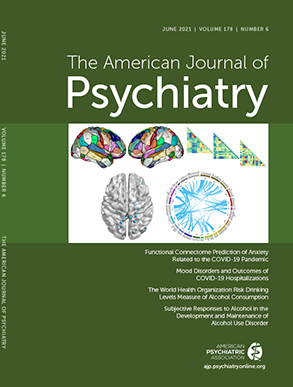To the Editor: We thank Drs. Rubinow, Lasser, and Kanes for their letter and their ongoing work in developing novel neurosteroids.
We agree with them that, despite shared positive allosteric modulation of the GABA
A receptor, there are differences in the mechanisms of actions of benzodiazepines and neurosteroids. However, their claim that it is these differences that account for the antidepressant effects of neurosteroids in humans—rather than their shared mechanisms with benzodiazepines—is less supported by human data. First, antidepressant effects of neurosteroids have been consistent only in phase 2 and 3 trials of postpartum depression, whereas results in studies of major depressive disorder have been inconsistent (
1,
2). Second, benzodiazepines themselves may have antidepressant effects: a Cochrane review of 4- to 6-week-long randomized controlled trials evaluating alprazolam as monotherapy for depression found superiority over placebo and no statistically significant difference with tricyclic antidepressants (
3). Third, as we detailed in our commentary, the recent neurosteroid trials have a significant limitation due to potential ascertainment bias (
4). Including a benzodiazepine comparator and establishing superiority of neurosteroids over benzodiazepines—best achieved by a three-arm (benzodiazepine, neurosteroid, and placebo) randomized controlled trial—would be an important step before attributing antidepressant effects to differences between neurosteroids and benzodiazepines (
4).
In our commentary, we suggest that studies measuring primary endpoints at 60 hours in postpartum depression and at 15 days in the treatment of major depression have unclear clinical significance. This is especially the case in light of a separate Cochrane review suggesting that benzodiazepines added to other antidepressants have short-term benefits in the treatment of depression but that these benefits dissipate after 4 weeks (
5). Among the two phase 3 randomized controlled trials of brexanolone for postpartum depression that declared 30-day treatment efficacy as a secondary outcome, one study showed a significant difference between groups at 30 days, while the other did not (
6). In the published phase 2 trial of SAGE-217 (zuranolone) for major depressive disorder, the difference between the zuranolone and placebo arms decreased after the end of acute treatment and was nonsignificant by the 35- and 42-day secondary endpoints (
1). (In another published phase 2 randomized controlled trial with 21 participants where the 30-day time point was not specified as a secondary outcome, brexanolone had sustained benefit over placebo in the treatment of postpartum depression [
7].) The recent topline unpublished results cited by Rubinow, Lasser, and Kanes from the SHORELINE study (announced in a press release on October 25, 2020) seem to belie their contention that improvements with neurosteroids are sustained (
8). Among individuals who initially responded to zuranolone, more than half of participants in this open-label uncontrolled study of major depression required retreatment within 1 year, and 15.8% of participants required four to five retreatments, raising the possibility that a subset of patients would receive frequent or indefinite retreatments outside of a trial setting (
8).
We are encouraged that the tolerance and withdrawal symptoms are being carefully monitored through the development of zuranolone, and we eagerly await publication of these results. As we stated in the commentary, a short-term treatment that is challenging to discontinue can easily become a long-term treatment, and “[a]fter discontinuation, trial participants should undergo long-term monitoring for cravings, desire to resume use, and recall of ‘drug-liking’ experiences” (
4). There is a long history of GABA
A positive allosteric modulators that have been marketed for psychiatric conditions, including carbamates, barbiturates, benzodiazepines, and Z-hypnotics. Given the history of this class of medications, we hope the approaches suggested in our commentary may improve trials assessing neurosteroids and may ultimately provide more salient information to clinicians and patients.

